|
|
|
Sort Order |
|
|
|
Items / Page
|
|
|
|
|
|
|
| Srl | Item |
| 1 |
ID:
129645
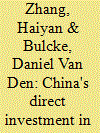

|
|
|
|
|
| Publication |
2014.
|
| Summary/Abstract |
While China is fast becoming an important outward direct investor, its companies are showing an increasing interest to locate in Europe and the European Union (EU). It has been suggested that this can partly be explained by the more lenient attitude of the European countries compared to the US, where some acquisitions were abandoned when they ran into political opposition based on security concerns. Yet, also in Europe, the media follow rather closely each new Chinese entry, and certain politicians have started to criticise the take-over of technology-oriented companies, especially by Chinese state-owned firms. Against the background of a very open foreign direct investment (FDI) policy as measured by OECD FDI Restrictiveness Index for the EU and the individual countries, an overview is given of the pre- and post-establishment obstacles to direct foreign investment. Also, the EU policy measures that directly or indirectly deal with incoming direct investment are discussed. Within the context of the EU competition policy and the merger regulation, the EU Commission has cleared five cases of take-over by Chinese state-owned enterprises. Although the Lisbon Treaty authorises the EU Commission to take charge of investment policy as part of the EU commercial policy, it will take time to realise this. If the announced negotiations about an investment treaty between China and the EU could work out the necessary balance, it would be an important step in achieving more reciprocity between their respective investment regimes.
|
|
|
|
|
|
|
|
|
|
|
|
|
|
|
|
| 2 |
ID:
129642
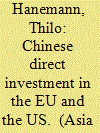

|
|
|
|
|
| Publication |
2014.
|
| Summary/Abstract |
Chinese outward foreign direct investment (OFDI) in developed economies has increased substantially in recent years, driven by policy liberalization and structural adjustments in China's economy. Efforts to accurately describe the dimensions of this increase are complicated by problems with official statistics and the complexity of deal structures. This article introduces the major problems of capturing data on global cross-border investment flows and elaborates on the particular difficulties of measuring Chinese outward FDI. It identifies alternative datasets that can help to better capture the scope and patterns of the Chinese overseas investment and uses one of them to describe the growth of Chinese investment in the EU and the US since 2000, highlighting similarities and differences in investment patterns in the world's two biggest economies.
|
|
|
|
|
|
|
|
|
|
|
|
|
|
|
|
| 3 |
ID:
129646
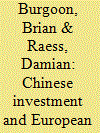

|
|
|
|
|
| Publication |
2014.
|
| Summary/Abstract |
The rapid increase in Chinese foreign direct investment (FDI) into Europe raises important questions about the implications of such for workers and organized labor in Europe: (1) does Chinese FDI flow more or less to regulated labor markets than do other investment sources?; (2) what are the strategies of works councilors and union representatives in dealing with real or expected investment from China?; and (3) how do individual workers view the propriety of Chinese FDI given China's low-wage, labor-unfriendly profile in the global economy? Quantitative and qualitative data on Chinese FDI, individual opinions about China and globalization, and on strategies of labor representatives provide some leverage to preliminarily answer these questions. First, Chinese FDI does not seem to be more (or less) focused on investing in the least regulated labor markets than other sources of FDI. Second, interviews with works councilors and union representatives in Germany, France and the Netherlands affirm a cautiously optimistic view of Chinese investors as no more or less threatening to organized labor than other investors. Third, analysis of attitudes about Chinese and European interests in managing globalization suggest that less-skilled, more vulnerable, pro-labor-union workers in Europe tend to be more rather than less enthusiastic about Chinese management than their fellow citizens. These patterns suggest a surprising, if tentative, embrace by workers and their representatives in Europe of that investment.
|
|
|
|
|
|
|
|
|
|
|
|
|
|
|
|
| 4 |
ID:
129639
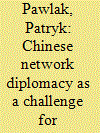

|
|
|
|
|
| Publication |
2014.
|
| Summary/Abstract |
For decades, a prevailing view has been that a very limited number of global issues can be resolved without the USA and European Union acting together. But in recent years, we have seen a growing body of scholarship addressing the question of the 'diffusion of power', 'the rise of the rest' or 'global zero'. With the financial crisis, questionable foreign policy choices and growing global competition from other international actors, both in terms of trade and ideas, the idea of the Western domination is increasingly questioned. At the same time, many international actors, including the European Union, are increasingly shifting-or 'rebalancing'-their attention towards China and other Asian markets introducing new dynamics to old alliances and relationships. Borrowing from the network analysis scholarship, this paper looks at the EU relationship with China through a conceptual lens of 'network power' and 'network diplomacy'. It applies this analytical lens to investigate the implications of EU-China relations for (1) the relations with the USA, (2) the relations with the ASEAN and (3) the effects of the trilateral EU-China-US cooperation on the region.
|
|
|
|
|
|
|
|
|
|
|
|
|
|
|
|
| 5 |
ID:
129636
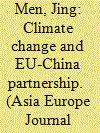

|
|
|
|
|
| Publication |
2014.
|
| Summary/Abstract |
Both the EU and China are important participants in the United Nations Framework Convention on Climate Change and the Kyoto Protocol. The EU's reliance on legally binding rules and institutions demonstrates its strong belief on institutionalism. While interstate cooperation is certainly necessary, implementation of any international agreement and most of the work needs to be done within a state. Henceforth, an uneasy balance between national interests and international responsibility has to be maintained. In the case of EU-China partnership, the carbon aviation tax issue serves as a good example to examine the realist-institutionalist struggle. Although it is still too early to tell if the EU and China would overcome their major disagreements in the field of climate change, there is reason to believe that an international agreement may be reached by 2015.
|
|
|
|
|
|
|
|
|
|
|
|
|
|
|
|
| 6 |
ID:
129625
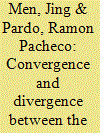

|
|
|
|
|
| Publication |
2014.
|
| Summary/Abstract |
The EU and China, the first and third largest economies in the world, launched a strategic partnership in 2003. From the onset, this partnership had two main objectives: deepening and broadening cooperation and enhancing bilateral collaboration on a wide range of policy areas at the global level. On the 10th anniversary of the partnership, this special issue seeks to provide a comprehensive analysis of the mechanisms, the evolution and current state of EU-China relations, and the divergence and convergence between them on a number of issues. The special issue includes articles setting out the historical and institutional background behind the EU-China partnership, examining their cooperation and problems in the economic, financial, climate change and security fields as well as in relation to third parties. In this way, this special issue covers the most important fields of policy coordination and cooperation between the EU and China.
|
|
|
|
|
|
|
|
|
|
|
|
|
|
|
|
| 7 |
ID:
129627
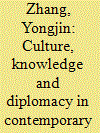

|
|
|
|
|
| Publication |
2014.
|
| Summary/Abstract |
The worlds that Matteo Ricci lived in-early modern Europe, Ming China and the pre-Westphalian international order-are vastly different from the world of the 21st century, when accelerated globalization binds China and Europe together as never before and when global international society is moving decisively beyond Westphalia. How much are the legacies of Matteo Ricci still relevant, 400 years on, to enriching the relationship between China and Europe in the 21st century? This paper starts with a brief overview of the civilizational encounters between China and Europe and the unfolding of their turbulent and often troubled relationship over the last four centuries of wars, collapse of empires, internal convulsions, nation-state building, scientific and industrial revolutions and great economic transformations. Against this historical narrative is the discussion of Matteo Ricci as a cultural agent, a knowledge broker and a practitioner of public diplomacy in fostering Sino-European relations in its nascent years. The paper argues that even in an increasingly globalized world, Matteo Ricci's conception of culture, his wisdom about the power of knowledge and his practice of people-to-people diplomacy remain valuable in informing both China and the EU, two aspiring global players, in their search for a viable China-EU strategic partnership.
|
|
|
|
|
|
|
|
|
|
|
|
|
|
|
|
| 8 |
ID:
129647
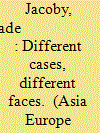

|
|
|
|
|
| Publication |
2014.
|
| Summary/Abstract |
Chinese investment in Central and Eastern Europe (CEE) is booming. As China's investment pattern has emerged so far, it appears to have little to do with Chinese firms' preferences for liberal policy regimes, tolerance for corruption, or reliance on communist-era networks. This article documents the current size and shape of Chinese firms' efforts to internationalize in this economic space, demonstrating an important difference between Chinese investment behavior in CEE and in the EU-15, namely the region's much more active use of greenfield activity (and lighter use of M&A and strategic alliances). Case studies of each mode (greenfield, M&A, and strategic alliances) reveal little evidence of a "China, Inc." approach and much evidence that Chinese firms are more motivated by market access than by technology or management assistance.
|
|
|
|
|
|
|
|
|
|
|
|
|
|
|
|
| 9 |
ID:
129634
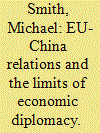

|
|
|
|
|
| Publication |
2014.
|
| Summary/Abstract |
This paper addresses a key problem in EU-China economic relations: the capacity of the EU to exert leverage through its economic diplomacy in the context of key economic trends, policy dilemmas, and processes of governance. The paper begins by identifying key elements of the EU's economic diplomacy and their relationship to key functions: deliberation, representation, communication, and negotiation. It continues by reviewing key trends and challenges in EU-China economic relations, in terms of trade, finance/investment, and broader issues of economic performance, with special reference to the problems emanating from the current economic turbulence both in the EU and in the broader global political economy. It then identifies a number of key policy dilemmas for the EU in areas such as trade defense/trade promotion, environment/development, security/commercial priorities, nvestment/sovereignty, and explores these in terms of three key concepts: orientation, coordination, and effectiveness. In pursuing this analysis, the paper relates these trends and dilemmas to attempts to govern EU-China economic relations: public/private, bilateral/multilateral, and regulatory/political. In the final section of the paper, these efforts are evaluated in the context of the EU's economic diplomacy, with relation to key actors, processes, and outcomes and to the key functions of deliberation, representation, communication, and negotiation.
|
|
|
|
|
|
|
|
|
|
|
|
|
|
|
|
| 10 |
ID:
129637


|
|
|
|
|
| Publication |
2014.
|
| Summary/Abstract |
The global financial crisis (GFC) and subsequent Eurozone sovereign debt crisis (ESDC) have made reform of the global financial governance regime a priority for governments around the world. Prior to the crisis, neoliberal policies agreed between the European Union and the USA created a financial governance regime based on the principle of free operation of the market through the norms of market self-regulation, equal access to the market, and stability via institutional supervision. How will global financial governance look like after these crises? And what role can the EU and China play in shaping this regime? This article argues that as a result of the GFC and the ESDC, stability is becoming a second principle of global financial governance, along with the free operation of the market. Meanwhile, European and Chinese views regarding the norms, rules, and decision-making procedures designed to implement those principles do not differ as much as they used to. Thanks to interactions at the bilateral and multilateral levels, the EU and China now have knowledge regarding how the other understands the role and characteristics that financial governance should have. This is leading to convergence in some areas and cooperation in others. Concurrently, there are also areas of competition. Analysing all of these is essential to understand how global financial governance might evolve, given the central role that the EU and China now play in this regime.
|
|
|
|
|
|
|
|
|
|
|
|
|
|
|
|
| 11 |
ID:
129638
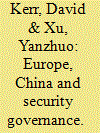

|
|
|
|
|
| Publication |
2014.
|
| Summary/Abstract |
Normative power can be defined as the ability to govern interdependencies by means of rules, regimes and compliance strategies. This paper presents two case studies in security governance-international responsibility to protect in Sudan and counter-proliferation policies towards Iran's nuclear programme-to evaluate the degree of normative convergence between China and Europe. It concludes that there are still major differences between Europe and China on employing normative strategies in security governance but that both modes of governance and identities as security actors are mobile so that the trend is towards convergence, albeit with some distance still to travel.
|
|
|
|
|
|
|
|
|
|
|
|
|
|
|
|
| 12 |
ID:
129644
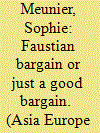

|
|
|
|
|
| Publication |
2014.
|
| Summary/Abstract |
This article explores the political challenges posed by the recent influx of Chinese outward foreign direct investment (OFDI) into the European Union (EU), which has become in 2011 the top destination for Chinese investment in the world. The central political question facing European states welcoming the influx of Chinese capital is whether this is a good bargain-a positive-sum game where both investor and investee benefit-or instead a Faustian bargain-a zero-sum game in the long term where capital is accompanied by implicit conditionality affecting European norms and policies, from human rights to labor laws. The novelty of Chinese FDI has the potential to affect politics in Europe in three different venues: inside European countries, between European countries, and between Europe and third countries. This article, whose main goal is to launch a research agenda on the political implications of Chinese FDI, explores in turn its potential impact on foreign and domestic policy, institutional process within the EU, and transatlantic relations
|
|
|
|
|
|
|
|
|
|
|
|
|
|
|
|
| 13 |
ID:
129640


|
|
|
|
|
| Publication |
2014.
|
| Summary/Abstract |
Though still a small percentage of the total stock of Foreign Direct Investment (FDI) present in European countries, FDI coming from China has risen dramatically in the European Union (EU) since 2009. This introduction to the special issue on "The Politics of Hosting Chinese Investment in Europe" examines the political fears aroused by this recent surge and by the prospect of continued Chinese direct investment in European economies. After surveying patterns of Chinese investment in the EU, this introduction asks what is distinctive about the potential economic and political consequences of Chinese FDI and lays out the argument for and against treating Chinese FDI as sui generis
|
|
|
|
|
|
|
|
|
|
|
|
|
|
|
|
| 14 |
ID:
129630


|
|
|
|
|
| Publication |
2014.
|
| Summary/Abstract |
This article looks at matters of trust, of structures and of dialogue in the European Union (EU)-China relations. It argues that EU-China relations need resetting given the increasingly negative perceptions of China in Europe and given Chinese dissatisfaction with what it considers to be a degree of EU incoherence, incompetence and inconsistencies. Their 'strategic partnership' proclaimed in 2003 in many ways is rather empty and lacks much coordination of diplomacy. Their economic relationship while substantial is problematic and asymmetric in nature. However, restructuring the relationship through new dialogue mechanisms and agreements may resettle their relationship along more pragmatic functional grounds. In particular, the creation in 2012 of a third High Level Dialogue, at Track-2 rather than Track-1 level, that of People-to-People (PPD), may reduce the 'trust deficit' in the still longer term. Consequently, the article seeks to contextualize and evaluate the rhetoric and substance surrounding the various dialogue meetings and structures emerging in 2012. It also considers the progress, or perhaps lack of progress, on concluding a Partnership and Cooperation Agreement (PCA). It concludes that one way forward is to de-politicize the partnership.
|
|
|
|
|
|
|
|
|
|
|
|
|
|
|
|
|
|
|
|
|